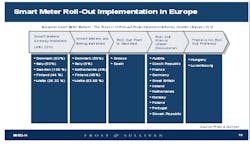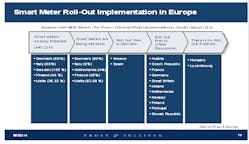Many European states are investing in smart metering in the drive to meet the European Union’s energy targets to be achieved by 2020, according to a report by Frost & Sullivan. The third energy directive is driving member states for 80 percent smart meter penetration by that date. However, Frost & Sullivan says region-wise disparity exists due to the different regulatory challenges faced by each country, thus having a direct impact on implementation.
Driven by this reality, Frost & Sullivan forecasts 26 percent growth in smart metering in Europe, with the UK holding the highest growth potential among all the European countries. The British Government has in fact announced plans to install 53 million electricity and gas smart meters in homes and businesses by 2019, while the French energy regulator CRE (Commission de régulation de l”énergie) has set out guidelines with an objective for mandatory implementation requiring all electricity consumers to have smart meters by 2016. On the other hand, no mandatory roll out has been planned in Germany.
Furthermore, Frost & Sullivan says Sweden attained 100 percent smart meter penetration in 2010, while Italy’s deployment is almost complete with 33.5 million smart meters installed in 2010. The three hotspots in Europe are France, UK and Spain, all of which Frost & Sullivan believes will see high levels of growth in smart meter installations in the next 2-3 years.
From the suppliers perspective, Frost & Sullivan says competition is high in the European smart meter market and is expected to increase along with new players entering the market. Chinese and other Asian companies are expected to enter the market in the short to medium term. Echelon and Landis & Gyr are the leading players holding nearly 90 percent of the market share in 2010.
Smart meter operation depends on the network architecture and protocols. Frost & Sullivan says a lack of standardization in communication protocols could lead to problems of interoperability. The term smart meter often refers to an electricity meter, but it can also mean a device measuring natural gas or water consumption.



